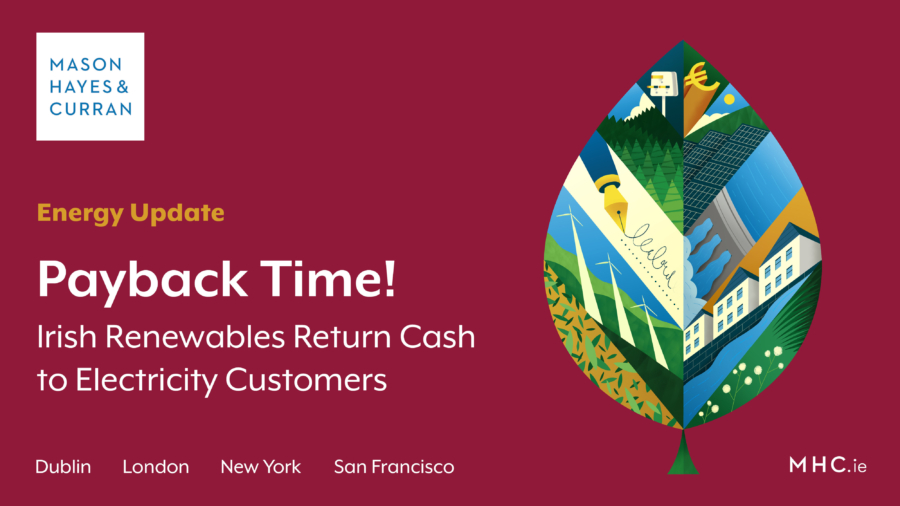
Ireland’s Public Service Obligation (PSO) mechanism, which normally levies money from Irish electricity consumers to help fund renewable energy developments, is going to start operating in reverse, and paying cash to electricity consumers. This is an unprecedented step and is occurring because wholesale electricity prices are currently so high that they will significantly exceed the prices at which renewable generators are supported.
PSO what?
The PSO levy was first imposed by the Irish government in 2003. In line with Ireland’s environmental and energy policy objectives, the levy was designed to create and maintain a pool of money that could be used to fund the support schemes deployed by the Irish government to promote various types of electricity generation. This provides the long-term certainty required to make such projects commercially attractive to developers and investors.
The two principal schemes funded by the PSO levy have been the Renewable Energy Feed-in Tariff (REFIT) and the Renewable Energy Support Scheme (RESS). REFIT has been closed to new entrants since 2015, but provides guaranteed minimum prices for renewable electricity, that are received by renewable generators via 15-year Power Purchase Agreements. The RESS scheme, currently in force, is similar, but the fixed price is set by a successful generator’s bid in a competitive auction.
The price is right?
The PSO levy enables those prices to be fully funded, by making up the shortfall between wholesale market revenues earned by renewable generators and the relevant REFIT or RESS price. Therefore, since the introduction of the PSO levy, the higher the wholesale market revenues earned by PSO-supported generators, the lower has been the PSO levy for customers.
The Commission for the Regulation of Utilities (CRU), Ireland’s energy regulator, is tasked each year with determining the annual amount (per kWh) of PSO levy that is payable by customers. While several factors contribute to the calculation, key among them is the price of wholesale electricity. For example, when these wholesale prices were high in 2019/2020, the PSO levy was €176M and when prices fell the following year, the PSO levy increased to €393M.
By comparison, 2022/2023 is forecast to feature wholesale electricity prices at record levels. The average baseload day-ahead price has already risen from €92.45/MWh in Q2 2021 to €180.71/MWh in Q2 2022. This is primarily a consequence of market sentiment towards the forward supply prospects of Russian natural gas to Western European markets. In Ireland, international natural gas prices are strongly influential on wholesale electricity prices. Prices this year are forecast to reach such heights, that when the CRU calculated what the PSO levy should be for 2022/2023, the result was negative, at minus €491M. Notably, the swing has been so significant that the Irish government and CRU have made the unprecedented decision to refund PSO moneys directly to electricity customers.
The Electricity Regulation Act 1999, which is the legal basis for the PSO levy, had to be amended so that when the CRU’s PSO levy calculation is negative, it is the electricity supply companies that will be charged, and customers that will be credited. This was achieved by the passage of the EirGrid, Electricity & Turf (Amendment) Act 2022 in June 2022, with the expectation that payments will be made to consumers during the year that runs from October 2022 to September 2023. To be precise, in such a “refund” scenario, the PSO levy will be fixed at €0, and a separate administrative mechanism will be established to make the payments to customers.
Alternatives to the PSO
Another consequence of the 2022 dynamics in the natural gas markets, and their knock-on effects on Irish wholesale electricity prices, has been that developers of new renewable electricity generation assets in Ireland are now reappraising the attributes of the respective “routes to market” by which their projects might expect to earn income.
While participation in RESS auctions remains popular, the competing “merchant”, short-term and corporate power purchase agreement (CPPA) routes are proving more attractive than they have traditionally. These routes to market involve a generator either selling directly into the wholesale electricity market (and enjoying all of the earnings), selling via an intermediary in return for a fixed price, or selling directly to a large consumer. None of these structures involve any support from the PSO. This raises the possibility that Ireland’s renewable energy targets may be attainable without the level of governmental support that was previously anticipated.
Decisions on the most appropriate route to market must, however, consider the likely price path over the entire operational lifetime of an asset, as well as how readily the route to market can be changed during this period. The PSO-guaranteed 15-year RESS floor price retains plenty of appeal, depending on one’s long-term outlook on wholesale electricity prices. When the next RESS auction, RESS-3, is held – scheduled for Q2 2023 – bidders will likely factor in the new higher levels of wholesale electricity prices and the winning RESS bids should inflate accordingly.
This competition between routes to market fits well with the climate objectives of the Irish Government. It is notable, for example, that the government’s Climate Action Plan includes a separate target that CPPAs account for 15% of electricity generated by 2030. If CPPA prices inflate in response to higher wholesale prices, CPPAs will likely gain market share, and it follows that a need to charge consumers through the PSO levy will lessen further.
Conclusion
The current geopolitical uncertainty, high international natural gas prices, and the consequent high wholesale electricity prices in Ireland, have improved the competitiveness of the PSO support scheme and allowed surplus cash to be returned to electricity customers. The same trends will likely encourage renewable energy developers to explore routes to market that do not involve PSO support – although note that the UK has not been deterred from unveiling its largest ever round of clean energy subsidies in July 2022.
While payments to consumers through the PSO mechanism is a novel development, it should be noted that it is forecast to translate to just €89 per domestic customer per year. While this will not fully compensate for the higher unit prices of electricity that are also expected, it is a welcome start.
For more information or if you would like to discuss how these issues may potentially affect your organisation, contact a member of our Energy team.
The content of this article is provided for information purposes only and does not constitute legal or other advice.
Share this:


